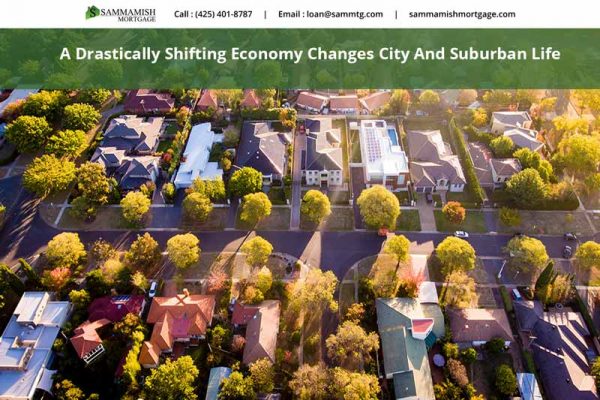No Obligation and transparency 24/7. Instantly compare live rates and costs from our network of lenders across the country. Real-time accurate rates and closing costs for a variety of loan programs custom to your specific situation.

Summary: Are you looking to make a move? If so, will you set your sights on the city, or the suburbs? It’s a tough decision to make, as both offer their own perks and drawbacks to consider. In this article, we’ll help you weigh the pros and cons of city living and suburban living to help you make your decision.
Proximity to work, space, amenities, and cost of living. These are all things that you’ll need to think about when you make a move to buy a home, which is where deciding between urban or suburban living comes into the picture.
Let’s take a look at the perks and drawbacks of each to help you decide which route to take when you finally buy a home.
A shift in living arrangements is happening across the country and in the Pacific Northwest as people are having a change of heart in the type of living arrangement they want. For instance, many New Yorkers are leaving the city in search of more space and a lower cost of living. More specifically, we’ve seen an average rate of one out of 20 people leaving NYC for something new over the recent past, and we’re also seeing this happen in the Pacific Northwest in states like Washington, Oregon, Idaho, and Colorado.
For example, people living in cities like Seattle and Portland are moving to nearby centers that boast a lower cost of living while providing more square footage and outdoor space, without having to compromise much in the way of being close to employment opportunities and amenities. In fact, people are moving to places like Tacoma and Eugene where they can get more bang for their buck while also taking advantage of the beauty of the outdoors that each center offers.
That means we’ll be seeing a shuffle happen across the nation over the next few years. When just 5% of a city’s population moves, that can have a big impact on the local economy, especially if the people leaving are at a high economic level. Things like this can change the real estate market, which can open the door to new opportunities while ending old ones.
Today, both city living and suburban living are more attainable than ever before for the average American citizen. So, you have options. But which way should you go?
Let’s go over the pros and cons of each option to help you make a sound decision for you.
We’ve gone through a trying time over the past few months with the current health crisis. It’s affected many things, including the economy, both on a local and national level. And while we will likely recover from this debacle over the next few years, it’s still difficult to predict where things will go. Until then, Americans who are financially capable may want to make some changes as their budget permits, including with real estate.
In Oregon and Washington, for instance, Portland and Seattle tend to be among the higher-priced centers for housing in each respective state. But you can buy a home for much less within a short radius of each, which often comes with more square footage and more outdoor property sizes. This has become an attractive feature for those who are looking to escape the tightness of condo living, especially as physical distancing measures continue.
We are now seeing a mass exodus of city dwellers moving to the outskirts, which means we will likely see a slight uptick in housing prices in the city as local businesses struggle to turn a profit. But, at some point, there will be a slew of great deals to come, and after interests are sold, entrepreneurs may leave. As such, people may be able to snag a home in the city at a better price at some point in the near future, which can help them save quite a bit.
Considering what we just mentioned, you may be able to get a desirable unit for thousands of dollars less than what it may have been worth only a few months earlier. You may even be able to get more centrally-located properties and be closer to entertainment and employment in the city, all while building equity.
The amenities that city folks may have been keen on taking advantage of are not operating at the same capacity as they once did pre-pandemic, if at all. For instance, movie theaters, bars, restaurants, and concert venues have been closed down or are only operating at minimal capacity. This trend seems to be happening in most cities across the country, including in the Pacific Northwest. People will eventually become disenfranchised and want to leave town.
Further, tighter quarters among residents could translate into social and legal unrest amongst citizens, especially in terms of pandemic restrictions. Arrests and confrontations with the local law have been occurring more frequently as of late.
Unfortunately, some people might not have the financial means to leave, which means they’ll be stuck in these urban centers and may be more prone to criminal activity, which means higher crime rates. This, in turn, will have a negative economic effect and will drive property values down. That’s one of the biggest drawbacks of city life right now.
As mentioned, many people are leaving the city in favor of the suburbs in order to escape the tight living quarters and take advantage of lower-priced properties that offer more space. But in addition to people leaving the city, many are also leaving their state completely in favor of a nearby state.
In the suburbs, people are more likely to be conscious of their health and that of others and make physical distancing a priority, which can be more easily done given the more open spaces. And those who have now adopted a regular work-from-home schedule are going to be better able to self-isolate while still enjoying more space that the suburbs offer.
Plus, homes in traditional suburban communities tend to retain their property value longer. Residents also have access to good schools, ample green space, and in many cases, decent employment opportunities for those looking to get back to work. Generally speaking, suburban life is considered the middle-class pinnacle of American life.
There are certain cons that you should be aware of if you decide to move to the suburbs. For one, the commute to the city will be longer if you still work there.
Secondly, it can be difficult to tell what type of neighbors you will have. While this might be the case for city living too, people who live in the suburbs tend to be stuck with a long-term mortgage, which means they are likely to be sticking around for a while. And if you have crappy neighbors, that can be a big detriment to your lifestyle.
Further, you may have to pay HOA fees if you live in a community run by a homeowners association. If so, you’ll also have to abide by their rules, which can often be stifling and restrictive.
In order to make the right move, your best bet is to do as much homework as you can on the community you are considering moving to, whether it’s in the city or suburbs. You may also want to expand the radius of where you are looking to get a sense of what’s out there. Take many factors into consideration, including price, amenities, commute, crime rate, space, and quality of life.
At the end of the day, you want to make sure that you are making an informed decision about whether to buy a home in the city or suburbs, and the only way to do that is to do some research.
The good news for city living is that property values are declining, which is providing people with the opportunity to snag a good deal while the cities continue to open up. The bad news is that social unrest continues, which can create a situation of increasing crime rates.
The good news for suburban living is that you’ll have more space, security, and equity-building thanks to rising property values. On the other hand, property values could fluctuate, neighbors may not be the best, and police presence isn’t always predictable.
There are pros and cons either way. Your job is to weigh them carefully before making your decision.
Are you considering buying a home in the near future? Sammamish Mortgage can help. We are a local mortgage company serving borrowers in Washington, Idaho, Colorado, and Oregon. We offer a wide variety of mortgage programs and products with flexible qualification criteria, and have been doing so since 1992. Please contact us if you have any questions or are ready to start the mortgage application process.


Whether you’re buying a home or ready to refinance, our professionals can help.
{hours_open} - {hours_closed} Pacific
No Obligation and transparency 24/7. Instantly compare live rates and costs from our network of lenders across the country. Real-time accurate rates and closing costs for a variety of loan programs custom to your specific situation.